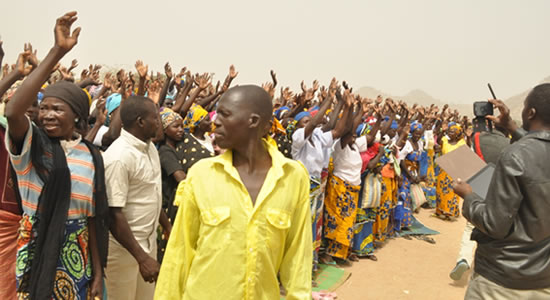Cameroon military authorities has carried out forcefully eviction of over 100,000 Nigerian refugees, mostly asylum seekers, in the hope of stemming the spread of Boko Haram, Human Rights Watch said in a report released on Wednesday. The group said in its new report that the deportation defied a plea by UN refugee agency to not return anyone to north-eastern Nigeria, where Boko Haram killed thousands of people, until security and human rights situation improved considerably.”
The HRW report noted that the deported people were likely to face new violence, displacement and destitution. The group, which investigates allegations of human rights abuses worldwide, says the report is based on interviews with more than 60 refugees.
It added that soldiers tortured, assaulted and sexually exploited Nigerian asylum seekers and denied them access to the UN refugee agency. The rights group claimed Cameroon deported, often violently, tens of thousands of the refugees since early 2015.
“The Cameroonian military torture and abuse of Nigerian refugees seems to be driven by an arbitrary decision to punish them for Boko Haram attacks in Cameroon and to discourage Nigerians from seeking asylum,” said HRW Associate Refugee Director, Gerry Simpson.
Tens of thousands of deportees from Cameroon end up in insecure militarized displacement camps or villages in Borno State, where conditions are dire, and women and girls face sexual exploitation. These sites are surrounded by the ongoing conflict between Nigeria’s armed forces and Boko Haram, which as of mid-September had displaced almost 2 million other Nigerian civilians.
Cameroon’s forced returns are a breach of the principle of nonrefoulement, which prohibits the forcible return of refugees and asylum seekers to persecution and, under regional standards in Africa, to situations of generalized violence, such as in northeast Nigeria.
Since 2014, Cameroonian armed forces have carried out operations against Boko Haram in the country’s Far North Region. Cameroon has the right to regulate the presence of non-nationals on its territory, including those proven to be threat to its national security. The authorities also have an obligation to carefully investigate attacks in Cameroon by suspected Boko Haram members. However, it may not block refugees from seeking asylum and summarily deport them.
After staying publicly silent on the situation for two years, in late March, UNHCR publicly criticised the authorities for their mass forced refugee returns. The criticism was triggered by deportations after Cameroon had signed an agreement that month with Nigeria and UNHCR confirming that it would ensure that all refugee return was voluntary.
As of mid-September, the Cameroonian authorities had allowed UNHCR only to pre-register asylum seekers in some border communities, leaving those pre-registered and tens of thousands of other asylum seekers without access to meaningful protection and putting them at risk of deportation.
The Cameroonian authorities deny any forced return or abuse of Nigerian asylum seekers and have not replied to a Human Rights Watch request for a response to the report’s findings.
Cameroon has had a reputation as a generous country toward refugees since the early 1970s and it has hosted tens and then hundreds of thousands of refugees since then.
“Faced with overwhelming evidence of mass refugee abuse and UN condemnation, Cameroon is trying to bury its head in the sand,” Simpson said. “But returning tens of thousands of Nigerians to harm and destitution will only further shred its well-deserved reputation as a generous refugee-hosting country.”




















)